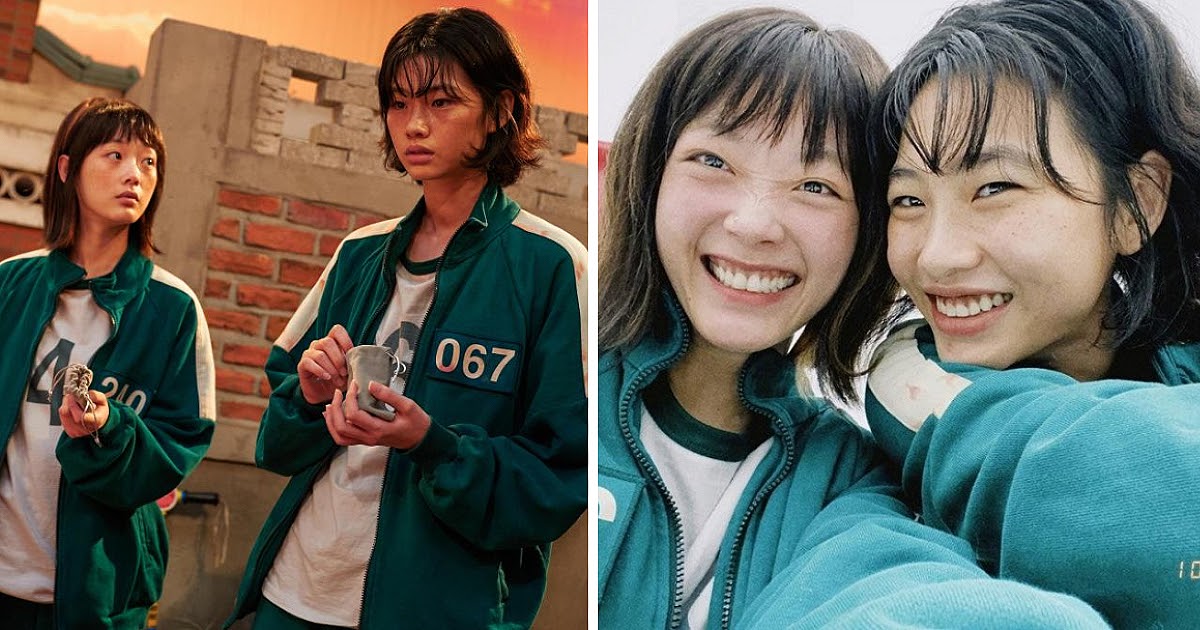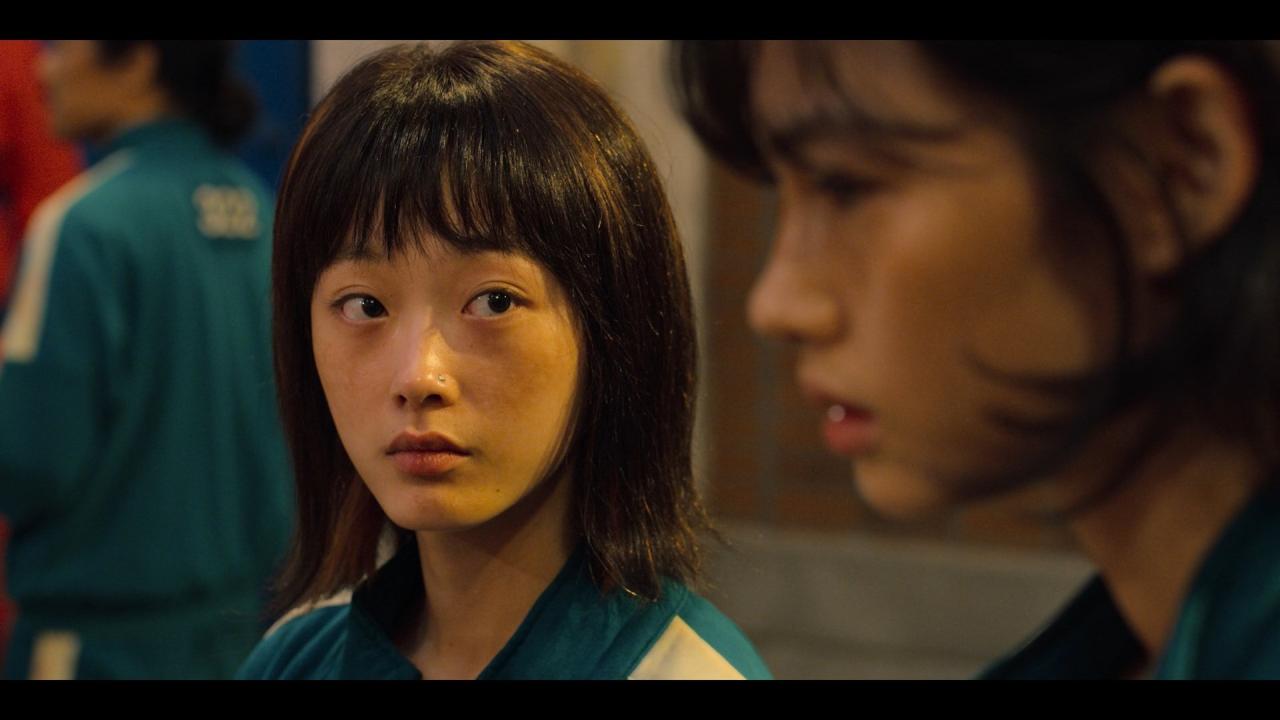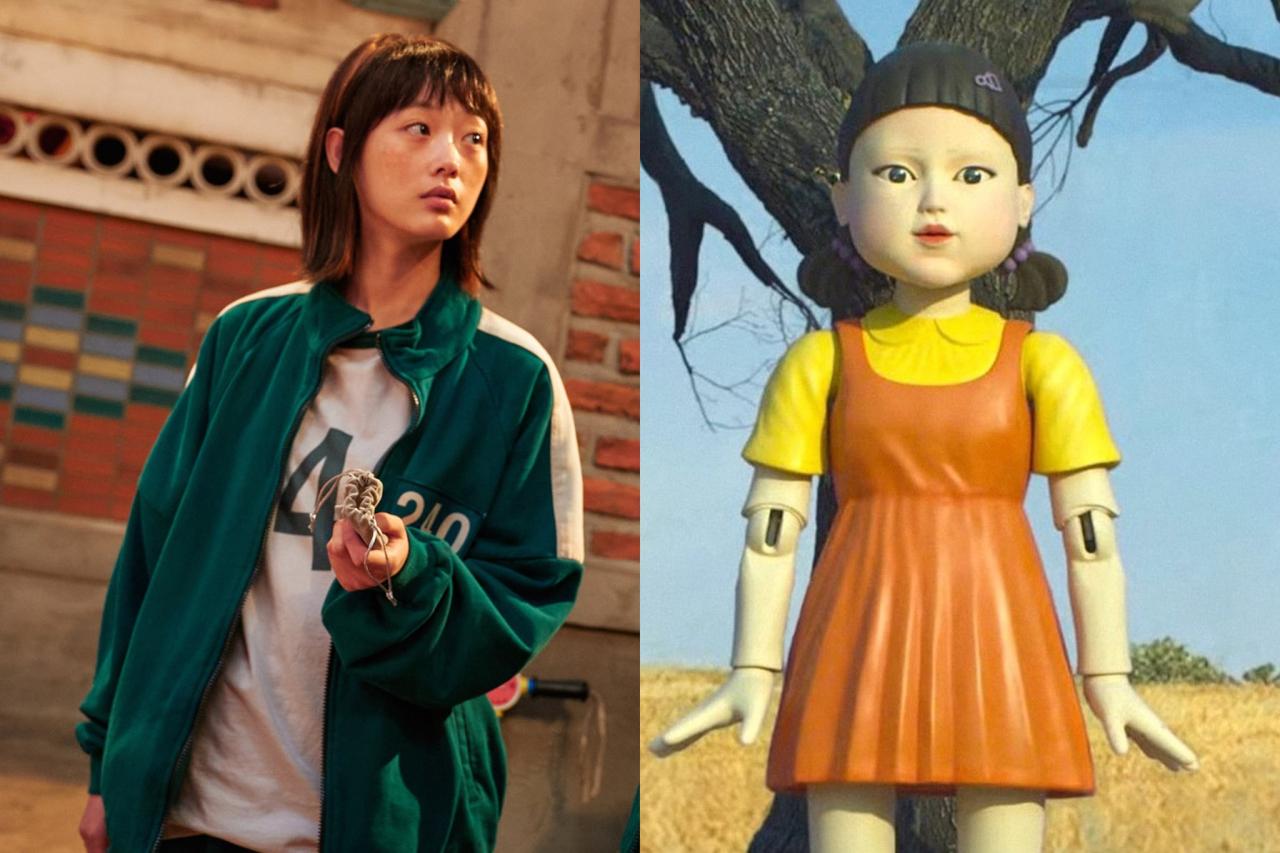Young Mi Squid Game isn’t just about survival; it’s a deep dive into the complexities of a young woman fighting for her life and the life of her sister. This exploration delves into Young Mi’s motivations, her evolving relationship with her sister, and the impact of her past on her decisions within the brutal games. We’ll examine her strategic thinking, her resourcefulness, and the powerful symbolism surrounding her character.
Prepare to uncover the layers of this compelling character and her unforgettable journey.
We’ll analyze her visual representation – her clothing, the use of color and lighting in her scenes, and how her expressions convey her internal struggles. Furthermore, we’ll explore fan interpretations, theories surrounding her backstory, and the lasting impact of her story on the overall narrative and viewers’ emotional responses. Get ready for a closer look at one of Squid Game’s most memorable and tragic characters.
Young Mi’s Character Arc in Squid Game

Young Mi’s journey in Squid Game is a compelling study of desperation, loyalty, and the brutal compromises made for survival. Her arc reveals the devastating impact of societal inequalities and the lengths to which people will go to protect those they love. We see her evolve from a fiercely protective younger sister to a resourceful and ultimately tragic figure.
Young Mi’s Initial Motivations
Young Mi’s primary motivation for entering the games is financial. She is deeply in debt and desperate to secure a better future for herself and her older sister, Gi-hun’s childhood friend. This desperation overrides any apprehension she might have about the inherent dangers of the competition. The lure of a massive cash prize eclipses the risk, highlighting the systemic issues that force individuals into such dire situations.
The Evolution of Young Mi’s Relationship with Her Sister
Initially, Young Mi’s relationship with her sister is defined by a fierce protectiveness and unwavering loyalty. She is fiercely devoted to her sibling, willing to risk everything for her well-being. This bond remains central to her actions throughout the games. Their shared struggle against poverty and their mutual reliance are palpable. While we don’t see major conflicts between them, their shared vulnerability and determination to survive together forms the backbone of their connection.
Young Mi’s Past Experiences and Decisions
Young Mi’s past is largely implied, but it’s clear that she’s experienced significant hardship. This hardship shapes her pragmatism and resourcefulness within the games. Her background likely contributes to her willingness to make difficult choices and to prioritize survival above strict adherence to moral codes. The desperation born from poverty and the lack of opportunities profoundly influences her decisions, highlighting the systemic factors driving her actions.
Comparing Young Mi’s Morality with Other Players
Compared to some players who exhibit a more pronounced selfishness or ruthlessness, Young Mi’s morality is nuanced. While she is willing to participate in violence, her actions are primarily motivated by a desire to protect her sister. Unlike players who readily betray or kill others for personal gain, Young Mi’s actions are largely driven by survival and loyalty, making her a more morally ambiguous but ultimately sympathetic character.
She operates within a brutal context, but her motivations remain rooted in familial love, distinguishing her from many of the more purely self-serving contestants.
Young Mi’s Internal Conflict Before a Crucial Game
The scene: It’s the night before the final game, the marble game. Young Mi sits alone, clutching the single marble she’s managed to keep. Her face is etched with exhaustion and worry. She recalls the faces of those she’s had to compete against, the ones she’s had to hurt, even the ones she has lost. A single tear traces a path down her cheek.
She whispers to herself, “It’s for her. It has to be.” The internal conflict isn’t about the game itself, but the moral cost of winning. The weight of the lives lost and the violence she’s endured clashes with her desperate need to secure her sister’s future. This inner turmoil underscores the devastating choices forced upon her by the games’ cruel design.
Young Mi’s Role in Key Game Moments

Young Mi, despite her limited screen time, plays a crucial role in several key moments of Squid Game, showcasing both strategic thinking and unwavering loyalty. Her actions directly impact the game’s narrative and the fates of several other players, revealing a character far more complex than initially perceived. Her resourcefulness and willingness to take risks significantly contribute to the overall tension and drama of the competition.Young Mi’s Strategic Thinking and AlliancesYoung Mi’s strategic thinking is most evident in her unwavering loyalty and calculated risk-taking within the context of her alliance.
She consistently prioritizes the well-being of her partner, Gi-hun, even when it puts her own survival at risk. This loyalty, while seemingly simple, is a strategic choice; trusting Gi-hun allows her to focus her energy on the games themselves rather than navigating complex social dynamics. This focus proves beneficial in several instances.
Young Mi’s Participation in the Tug-of-War Game
The tug-of-war game perfectly exemplifies Young Mi’s resourcefulness. Initially, her team appears to be at a significant disadvantage, lacking the physical strength of the opposing team. However, Young Mi’s quick thinking proves vital. Observing the opposing team’s strategy – a brute-force approach relying on sheer muscle – she suggests a counter-strategy. She quietly directs her team to synchronize their pulls, focusing on rhythm and timing rather than raw power.
This subtle shift in strategy allows her team to gain an advantage, using coordinated effort to offset the other team’s strength. The scene depicts her whispering instructions, subtly adjusting her team’s stance and pull, illustrating her leadership abilities and understanding of physics. The tension builds as her team struggles, but her calculated approach ultimately contributes to their victory, highlighting her tactical acumen and ability to overcome physical limitations with strategy.
Had her team relied solely on brute strength, they would have almost certainly lost. Her quiet leadership saved them all.
Young Mi’s Resourcefulness in the Marbles Game
While not directly shown, the implication is strong that Young Mi’s resourcefulness played a key role in her and Gi-hun’s survival during the marbles game. The game heavily relied on trust and deception. Young Mi’s quiet demeanor and observant nature likely allowed her to gauge the trustworthiness of other players, allowing her to avoid potentially fatal alliances. Her ability to assess and exploit weaknesses in others would have been essential to their survival.
The fact that she and Gi-hun are among the few to survive this deadly game speaks volumes about their combined skills.
Impact of Young Mi’s Actions on Other Players
Young Mi’s actions, though seemingly minor in the grand scheme of the game, have a significant impact on other players. Her unwavering loyalty to Gi-hun indirectly impacts the choices of those around them, influencing alliances and potentially altering the outcome of games. Her presence acts as a silent force, reminding other players of the human cost of the games and the importance of unexpected alliances.
Her strategic thinking, even if subtle, impacts the overall dynamics of the competition. Her death, ultimately, acts as a catalyst for Gi-hun’s later actions.
Young Mi’s Visual Representation and Symbolism

Young Mi’s visual presentation inSquid Game* is crucial in conveying her desperation, resilience, and ultimately, her tragic fate. Her appearance, the color palette surrounding her, and her subtle yet powerful body language all contribute to a compelling and heartbreaking portrayal. The filmmakers cleverly utilize visual cues to communicate her inner turmoil and foreshadow her demise.
Young Mi’s Clothing and Appearance
Young Mi is consistently depicted in drab, muted clothing. This reflects her impoverished background and lack of resources. Unlike some players who might have retained elements of their previous lives in their attire, Young Mi’s clothes are functional and plain, emphasizing her vulnerability and highlighting the stark reality of her situation. The lack of bright colors further underscores her bleak circumstances and the desperation driving her actions.
Her clothes are not merely clothing; they are a visual representation of her poverty and her lack of agency. The simple, worn nature of her garments directly contrasts with the opulent setting of the games themselves, highlighting the immense disparity between her life and the artificial world she is thrust into.
Color and Lighting in Scenes Featuring Young Mi
The color palette surrounding Young Mi often consists of muted grays, browns, and greens, reinforcing the feeling of despair and hopelessness. This contrasts sharply with the bright, almost garish colors used in other scenes, such as the vibrant pink of the guards’ uniforms or the sickly sweet pastels of the game sets. This visual disparity further emphasizes Young Mi’s marginalized position within the game’s artificial world.
Lighting often casts her in shadow, visually isolating her from the other players and reinforcing her sense of loneliness and vulnerability. This use of chiaroscuro—the interplay of light and shadow—heightens the dramatic tension and amplifies the viewer’s emotional connection to her plight.
Young Mi’s Expressions and Body Language
Despite her limited screen time, Young Mi’s emotional state is powerfully conveyed through her subtle facial expressions and body language. Her eyes often hold a mixture of fear and determination, reflecting her desperate struggle for survival. Her posture is frequently hunched, reflecting her weariness and the weight of her responsibilities. Even in moments of seeming calm, a subtle tremor in her hands or a fleeting look of anxiety betrays her underlying apprehension.
Her quiet strength is evident in her unwavering resolve to protect her daughter, despite the overwhelming odds against her. The subtle nuances of her performance speak volumes, even without dialogue.
Comparative Visual Representation of Characters
| Character Name | Dominant Colors | Clothing Style | Key Visual Cues |
|---|---|---|---|
| Young Mi | Grays, Browns, Greens | Plain, Worn, Functional | Tired eyes, hunched posture, subtle anxiety |
| Gi-hun | Blues, Grays, occasional reds | Casual, slightly disheveled | Worry lines, conflicted expressions, hopeful glances |
| Sang-woo | Dark blues, blacks, grays | Sharp, clean, initially professional | Controlled demeanor, increasingly desperate expressions |
| The Front Man | Black, Red | Formal, imposing uniform | Blank expression, detached demeanor, cold eyes |
Visual Representation of Young Mi’s Internal Struggle
Imagine a flickering candle flame, representing Young Mi’s fragile hope. The flame dances wildly, buffeted by fierce winds (representing the harsh realities of the games and her desperate circumstances). Surrounding the flame are swirling shadows, representing her fear and uncertainty. Yet, even as the wind howls and the shadows threaten to extinguish the flame, a tiny ember of unwavering determination persists—a stubborn spark of maternal love fueling her fight for survival and her daughter’s future.
Okay, so you’re into Young Mi from Squid Game, right? Her intense focus and survival skills are amazing. Think about the spectacle of those games, and how visually stunning they were; now imagine that level of coordinated movement, but instead of people, it’s drones creating incredible firework displays like the ones you can see from these guys drone fireworks china.
It’s a similar level of precision and planning, just with a different kind of high-stakes drama. Young Mi would probably appreciate the technical artistry involved.
This inner strength, though small, is the core of her character, a powerful contrast to the darkness surrounding her.
Fan Interpretations and Theories about Young Mi
Young Mi, despite her limited screen time inSquid Game*, has captivated fans, sparking numerous interpretations and theories surrounding her backstory, motivations, and ultimate fate. Her quiet strength and unwavering loyalty to her brother make her a compelling and tragically relatable character, fueling a wealth of fan-created content and discussions.
Common Fan Theories Regarding Young Mi’s Backstory
Many fans speculate about Young Mi’s life before the games. Theories range from her having a difficult childhood marked by poverty and hardship, mirroring the struggles faced by many other players, to a more nuanced past involving perhaps a specific traumatic event that drove her to desperate measures. Some theorize she may have been forced into debt by unscrupulous lenders, a common theme explored in the series.
Others believe her brother’s debt was primarily her responsibility, explaining her fierce determination to win. The lack of explicit backstory allows for a wide range of interpretations, contributing to her enigmatic appeal.
Interpretations of Young Mi’s Motivations and Actions, Young mi squid game
Fans generally agree that Young Mi’s primary motivation was to secure her brother’s freedom and provide for him. Her quiet demeanor and reserved nature, however, lead to varied interpretations of her emotional state. Some see her as stoic and emotionally detached, driven solely by pragmatism. Others perceive a deep well of suppressed grief and desperation fueling her actions. Her seemingly calm exterior, in this view, masks intense emotional turmoil.
The ambiguity in her portrayal leaves room for multiple perspectives on her inner life and decision-making process.
Young Mi’s story in Squid Game is a heartbreaking example of how desperation can lead to devastating choices. Her vulnerability highlights the brutal stakes of the games, contrasting sharply with seemingly simpler childhood games like the jack and jill game , which represents a carefree innocence lost in the Squid Game’s harsh reality. Ultimately, Young Mi’s fate underscores the show’s commentary on societal inequalities.
Analysis of Fan-Created Content Featuring Young Mi
Fan art often depicts Young Mi in a variety of ways, reflecting the different interpretations of her character. Some pieces emphasize her strength and resilience, portraying her as a warrior-like figure. Others focus on her vulnerability and sadness, highlighting her emotional struggles. Fanfiction expands on her backstory, often exploring her relationship with her brother in greater detail, inventing past experiences that shape her present actions.
Some stories delve into potential romantic relationships, adding another layer to her character. The common thread across these works is a deep empathy for Young Mi’s plight and a desire to explore her untapped potential.
Recurring Themes in Fan Discussions about Young Mi
A common theme in fan discussions is the exploration of sisterly love and familial bonds. Young Mi’s unwavering loyalty to her brother resonates deeply with viewers, sparking conversations about the sacrifices people make for loved ones, particularly in desperate circumstances. Another recurring theme is the discussion of the moral ambiguities presented by her participation in the games. While her actions are driven by a desire to help her brother, fans debate the ethical implications of her involvement in such a brutal and violent competition.
This moral ambiguity makes her a complex and fascinating character.
Impact of Young Mi’s Character on the Overall Reception of Squid Game
Young Mi’s character, despite her limited role, has significantly contributed to the overall impact ofSquid Game*. Her quiet strength and tragic fate have resonated with audiences, making her a memorable and sympathetic character amidst a cast of complex individuals. Her story, though incomplete, serves as a poignant reminder of the desperation and sacrifices people make to survive in the face of overwhelming adversity.
The emotional weight of her story has undoubtedly amplified the show’s overall message about social inequality and the human cost of systemic injustice.
Young Mi’s Impact on the Narrative
Young Mi’s seemingly minor role inSquid Game* belies her significant impact on the show’s narrative. Her tragic story, though brief, powerfully reinforces the series’ central themes of desperation, societal inequality, and the brutal dehumanization inherent in a system built on exploitation. Her death, in particular, acts as a potent catalyst, driving the plot forward and profoundly affecting the emotional landscape for both other characters and the viewers.Young Mi’s death contributes to the show’s exploration of systemic failure and the desperation of the marginalized.
Her story highlights the extreme lengths people will go to in order to survive, even resorting to actions that contradict their moral compass. Her vulnerability, amplified by her desperate attempt to protect her brother, underscores the brutal reality of the games and the lack of safety nets for those struggling at the bottom of society. This stark portrayal contrasts with the seemingly privileged lives of the VIPs, highlighting the vast chasm between the rich and the poor and the inherent injustice of their unequal positions.
Young Mi’s Impact on Viewer Emotion
Young Mi’s arc elicits a strong emotional response from viewers. Her initial sweetness and innocence, quickly juxtaposed with her fierce protectiveness of her brother, creates a powerful empathy. Her unwavering loyalty and ultimately, her tragic death, leave a lasting impression, serving as a stark reminder of the human cost of the games. The scene of her death is particularly impactful due to its suddenness and the palpable sense of injustice; it underscores the randomness and cruelty of the situation, prompting viewers to question the moral implications of the games and the society that allows such a system to exist.
This emotional resonance significantly elevates the show’s impact, making the viewer deeply invested in the fate of the other players.
Young Mi’s Influence on Other Characters
Young Mi’s death profoundly impacts Gi-hun’s journey. Witnessing her death strengthens his resolve to survive, not only for himself but also as a form of vengeance against the system that allowed such tragedy to occur. Her death serves as a turning point, hardening his resolve and fueling his eventual confrontation with the game’s organizers. The memory of Young Mi, and the promise he made to her brother, becomes a driving force behind his actions in the final episode.
The shared trauma experienced by the players, particularly the death of Young Mi, also strengthens the bonds between some of the surviving players, highlighting the unexpected connections forged in the face of shared adversity.
Young Mi’s chilling performance in Squid Game really stuck with viewers, right? Her ruthless efficiency made her a memorable character, and it got me thinking about other memorable villains. That led me to a really interesting comparison article about the similarities between her and, of all things, squid game thanos , which is a surprisingly insightful read.
Going back to Young Mi, her arc really highlights the desperation and moral compromises the games force on participants.
Significance of Young Mi’s Final Moments
Young Mi’s final moments are crucial to the show’s overall message. Her desperate attempt to reach her brother, coupled with her unwavering loyalty and sacrifice, embodies the themes of familial love and the lengths to which people will go to protect their loved ones. The helplessness of her situation, and the abruptness of her death, resonate deeply, leaving a lasting impression of the game’s mercilessness and the inherent unfairness of the system.
The fact that her death is essentially meaningless in the grand scheme of the game only serves to amplify the tragedy and the sense of profound loss.
Alternate Ending: Young Mi Survives
[SCENE START]The marbles are about to fall. Gi-hun, eyes locked on Young Mi’s, hesitates. He’s about to lose, but he throws his marble to the ground instead. “I choose to live,” he declares, his voice echoing in the tense silence. The guards are stunned, momentarily frozen.
Young Mi, equally surprised, cautiously picks up the marble. Gi-hun, ignoring the rules, grabs Young Mi’s hand and pulls her away from the line, shielding her from the guards. They flee together, joining the small group of escapees, their lives forever changed by the shared experience and the unexpected alliance forged in the face of death.[SCENE END]
Closure

Young Mi’s story in Squid Game transcends a simple character arc; it’s a poignant exploration of desperation, loyalty, and the devastating consequences of societal inequality. Her journey, though tragically cut short, leaves a lasting impression, forcing viewers to confront the harsh realities depicted within the games and the emotional weight of her choices. Through analyzing her actions, motivations, and visual representation, we gain a deeper understanding of the show’s overarching themes and the unforgettable impact of this complex character.
Expert Answers: Young Mi Squid Game
What are some common misconceptions about Young Mi?
Some viewers misinterpret Young Mi’s actions as purely selfish, overlooking the desperate circumstances driving her choices and the depth of her loyalty to her sister.
How does Young Mi’s character contribute to the show’s social commentary?
Young Mi’s struggle highlights the desperation faced by vulnerable individuals within a deeply unequal society, underscoring the show’s critique of capitalist systems and social injustice.
Why is Young Mi’s death so impactful?
Her death is impactful because it underscores the brutal reality of the games and the high stakes of survival, while simultaneously highlighting the devastating loss of innocence and hope.